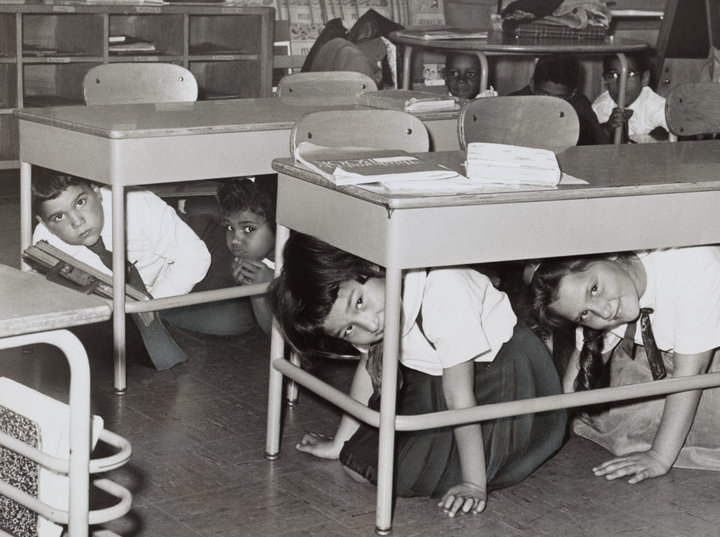
[ Back to Historical Fiction ] -> [ Back to Suspect Red ]
The Cold War & Korean War
Suspect Red
(See below the essay for links).
The “Cold War” started as soon as WWII ended, when the Soviet Union and the United States emerged as super-powers and immediately squared off in an atomic arms race. “Cold” because no shots were directly fired between the two nations, but “war” because of a tense and escalating battle of competing ideologies, propaganda, espionage, and trying to spread influence across the globe. The fear of nuclear holocaust became a permanent reality. Drills like “duck and cover” that promised false safety became frequent events for school children.
When we consider the era’s timeline, it makes sense that McCarthy’s extremist rhetoric could at first take hold in patriot-American minds. World War II and its horrors had ended only five years earlier. Our veterans and their families who survived that apocalyptic conflict sincerely believed they had fought Hitler and the Axis powers to make the world safe for democracy. After all that sacrifice, bloodshed, and loss, they ached for peace.
But Communism and another demagogue, just as murderous as Hitler, threatened that. Between 1945 and 1950, the Soviets and their leader Josef Stalin had drawn an “iron curtain” across Eastern Europe, taken over Poland, arrested thousands in Hungary, blockaded East Germany and East Berlin, and fermented a Communist coup in Czechoslovakia. Reports of Russian dissidents and Jews being sent to Siberian gulags to labor and freeze to death were growing. And, most ominously, the Soviets had tested and successfully detonated their first atomic bomb in 1949, crowing that the United States no longer had a monopoly on that technology or that power.
In Asia, China had fallen to Mao Tse-tung’s Communist army and French-controlled Vietnam was desperately fighting Communist rebels. Then, in June 1950, a Soviet-backed and supplied North Korea invaded the democratic South Korea. Peacekeeping troops from the United Nations and thousands of Americans came to South Korea’s defense.
The Korean War lasted for three long years, killing 36,574 Americans, 620,000 North and South Korean soldiers, and 600,000 Chinese soldiers, as well as millions of Korean civilians.
Spying between the two countries escalated, and public paranoia about Communist agents hiding in America and working to undermine it skyrocketed when the Rosenbergs were convicted of giving atomic technology to the Soviets. There were other highly publicized cases including one I write my FBI dad, Don, into. A woman named Judith Coplon worked in the Justice Department’s Foreign Agents Registration division as the go-between with the FBI. When the bureau suspected her of leaking its cases to the Soviet’s KGB, the FBI wiretapped her phone and then planted a fake document about American assets at her office. She took the bait and met with her contact—a man working for the Russian delegation at the United Nations.
Her conviction was overturned in appeals court because of the important civil liberties guaranteed to everyone by our constitution. The judge determined that her arrest was illegal because the FBI had failed to obtain an appropriate warrant and then lied about the wiretap. But Coplon’s alleged treachery convinced Americans that no one could be presumed loyal. If a cum laude graduate of a highly respected, Ivy-league women’s college could be lured into selling the nation’s top-secrets, anyone could be.
Behind the scenes, many FBI and intelligence officers also knew that a handful of fellow Americans had compromised our ability to monitor Soviet communiqués. The general public was not aware of it at the time, but today, because of the Freedom of Information Act and the collapse of the Soviet Union in 1991, we know that decoding work as the Venona Project—a counterintelligence office run by the Army’s Signal Intelligence Service, the precursor to today’s NSA, the National Security Agency.
In the chaos following the Allies’ invasion of Germany, American soldiers had discovered a cipher pad left behind by Soviet troops. It allowed U.S. cryptographers to read thousands of intercepted Soviet cables—revealing large-scale attempts at spying within the American government by KGB-handled operatives. The Army and the FBI knew, for instance, that the Soviets had code names for Julius Rosenberg (Antenna), and his brother-in-law, David Greenglass (Bumblebee).
Six weeks before the Soviets tested their first atomic bomb, our ability to decode Soviet messages “went dark.” A Russian translator within Venona and a British intelligence officer posted in England’s embassy in Washington, DC, were suspected of informing the Soviets that U.S. intelligence could read their messages. The Soviets immediately changed their codes.
This was long before surveillance satellites. Some experts speculate that had Venona cryptologists still been able to decode the Soviet’s military communications regarding its supply and training of North Korean troops, we might have been able to use diplomacy to prevent the Korean War.
Even after the Senate censored McCarthy and stopped his committee, tension between the Soviets and the United States continued, coming to a dangerous head with the Cuban Missile Crisis in 1962. For a terrifying 13 days, the United States blockaded the waters around Cuba to prevent Soviet ships delivering parts that would activate the missiles and silos that an American spy plane had discovered the Soviets were secretly building on the island. Deborah Wiles wrote an amazing look at how the crisis might affect young people in her award-winning novel Countdown: http://deborahwiles.com/site/books-2/countdown/
Links to learning more:
The Cold War:
https://www.britannica.com/event/Cold-War
http://www.american-historama.org/1945-1989-cold-war-era/the-cold-war.htm
http://www.history.com/topics/cold-war/red-scare
https://
"Duck and Cover":
https://www.youtube.com/
https://lmelliott.com/
New York Civil Defense Drill, 1954:
https://www.youtube.com/watch?v=sb-BPI0bgqs&index=10&list=PLyPpOu1URSDH0nzuQ8CjOR-ml655_eozl
"How to Recognize a Communist" and The Red Scare:
https://www.youtube.com/watch?v=lTgt0tGS8YY&list=PLyPpOu1URSDH0nzuQ8CjOR-ml655_eozl&index=8
https://www.youtube.com/watch?v=A4LpLqHNOTk
The Korean War:
http://www.history.com/topics/korean-war
http://www.digitalhistory.uh.edu/disp_textbook.cfm?smtid=2&psid=3406
http://www.bbc.co.uk/history/worldwars/coldwar/korea_hickey_01.shtml

